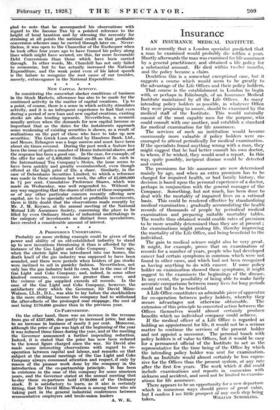Insurance
AN INSURANCE MEDICAL INSTITUTE.
I READ- recently that a London specialist predicted that a man he examined would prObably die within a year. Shortly afterwards the man was examined for life assurance by a general practitioner, and obtained- a life policy fot a substantial amount. He died within twelve months, and the policy became a claim.
Doubtless this is a somewhat exceptional case, but it suggests a course which would seem to be greatly to the advantage of the Life Offices and their policy holders. That course is the establishment in London to begin with, or perhaps in Edinburgh, of an Insurance Medical Institute maintained by all the Life Offices. As many intending policy holders as possible, in whatever Office they were proposing to assure, should be examined by the medical staff of the Institute. This would naturally consist of the most capable men for the purpose, who could consult with one another, and establish a standard for medical examination for life assurance.
The services of such an institution would become enormously more valuable if policy holders were en- couraged to attend periodically for medical examination. If the specialists found anything wrong with a man, they might suggest that he had better consult his own doctor, to whom, if he wished, they would send a report. In this way, quite possibly, incipient disease would be detected and cured.
The premiums for life assurance are now determined mainly by age, and when an extra premium has to be charged for impaired health, or bad family history, the decision is based upon the personal experience of a doctor, perhaps in conjunction with the general manager of the Company. Something, but not much, has been done to deal with the mortality of impaired lives on a rational basis. This could be rendered effective by standardizing medical examination ; gradually accumulating the health records of thousands of people by periodical medical examination and preparing suitable mortality tables. The results thus obtained would enable rates of premium to be more sensibly determined than they are at present ; the examinations might prolong life, thereby improving the mortality of the Life Office, and being beneficial to the individual.
The gain to medical science might also be very great. It might, for example, prove that on examination of records for a number of years, people who had developed cancer had certain symptoms in common which were not found in other cases, and which had not been recognized as having anything to do with cancer. If some policy holder on examination showed these symptoms, it might suggest to the examiners the beginnings of the disease. In any event, the possibility of being able to make fairly accurate comparisons between many lives for long periods could not fail to be beneficial.
A Life Office constitutes an admirable piece of apparatus for co-operation between policy holders, whereby they secure advantages not otherwise obtainable. The extension of this principle to concerted action between the Offices themselves would almost certainly produce benefits which no individual company could achieve. If the medical officer of a Life Office is regarded as holding an appointment for life, it would not be a serious matter to continue the services of the present holder and not appoint a successor. The personal touch with policy holders is of value to Offices, but it would be easy for a permanent official of the Institute to act as the representative for the time being of the Office by which the intending policy holder was sent for examination. Such an Institute would almost certainly be less expen- sive for the Offices than the present system, at any rate. after the first few years. The work which it did could include examinations and reports in connexion with sickness and accident, and need not be limited to examin- ations for life assurance. There appears to be an opportunity for a new departure which in numerous ways should prove of great value, but I confess I see little prospect of any such step being






































 Previous page
Previous page